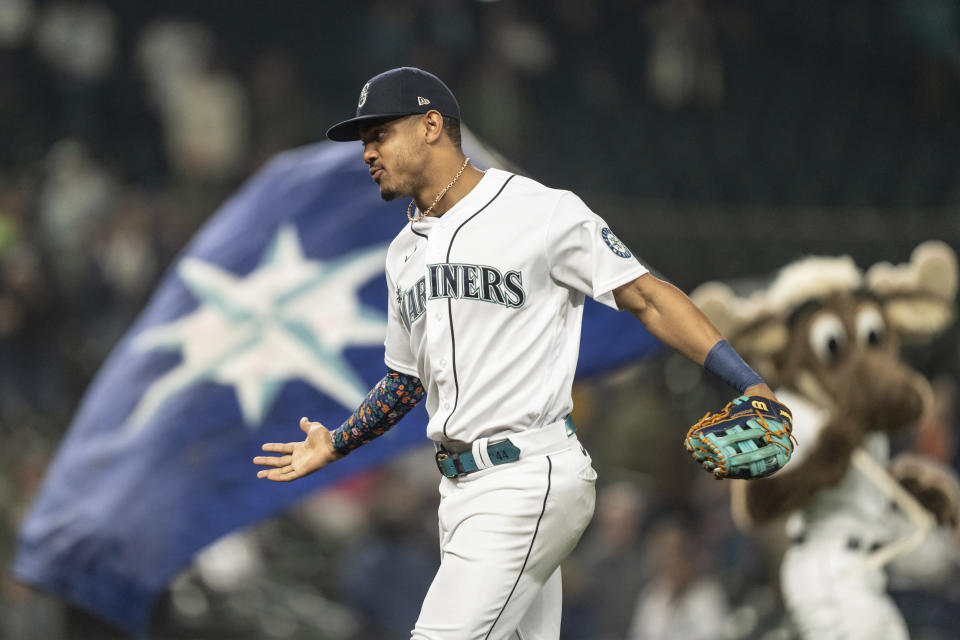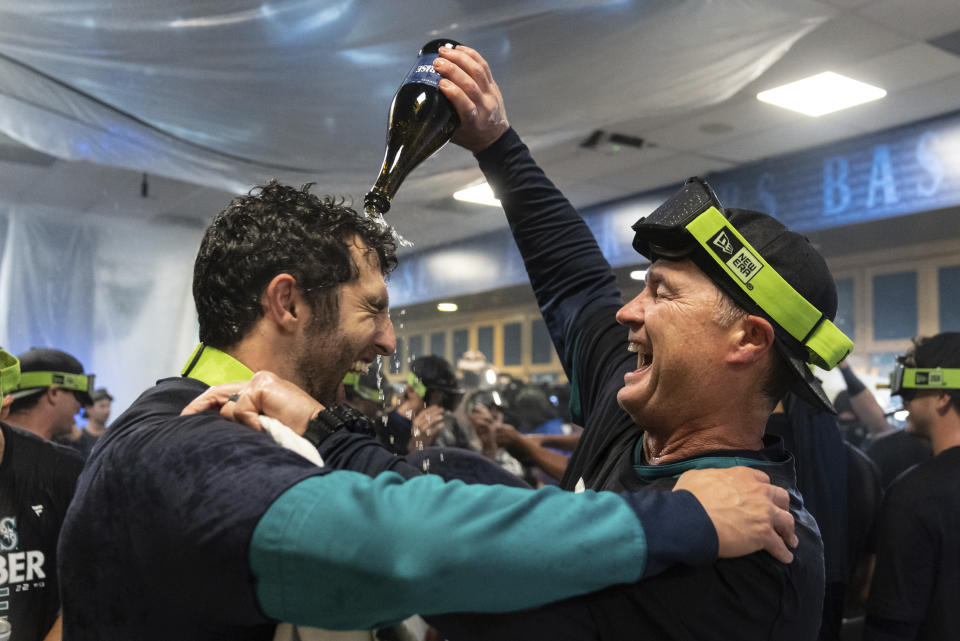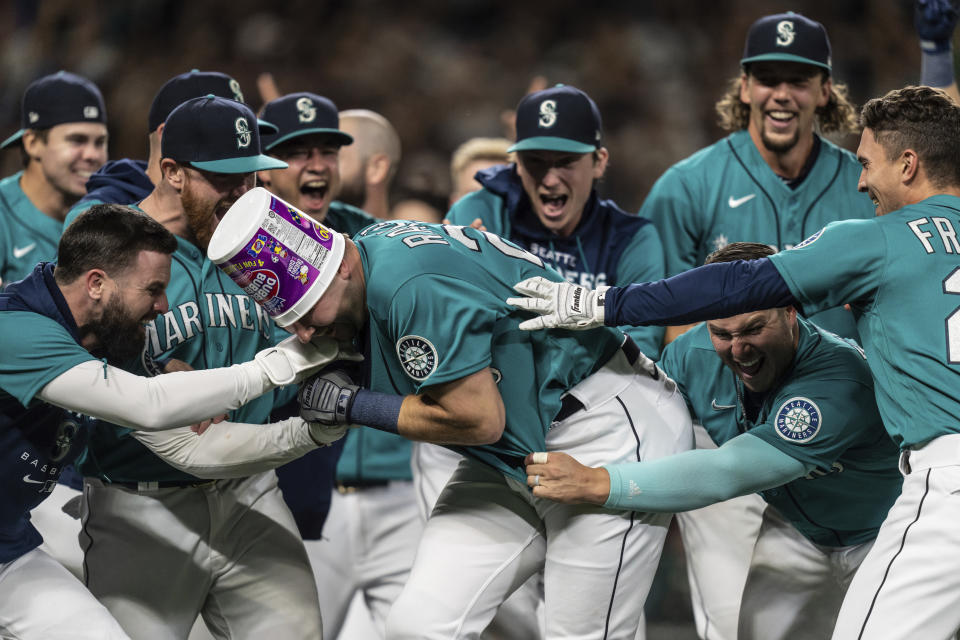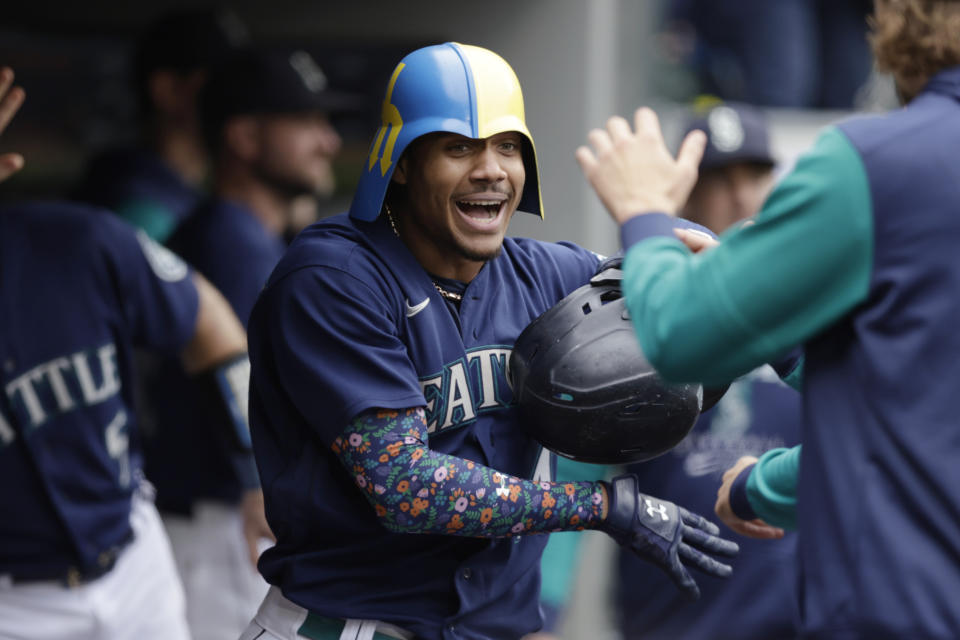SEATTLE — The Seattle Mariners got off to a terrible start in 2016, which was then-general manager and now president of baseball operations Jerry Dipoto’s first full season with the team. After an especially brutal loss amid that first 2-6 stretch, he went into the office and an administrative assistant looked up at him with forlorn empathy.
“Jerry, I’m so sorry,” she said. “You’ll get used to it. We all have.”
That was how the Mariners’ head of baseball operations was first indoctrinated into The Drought.
Decision to take a ‘step back’
At the time, Seattle hadn’t been to the postseason in 15 years. It got worse before it got better, but better was worth it. After 21 years, the Mariners ended the longest extant drought in North American major league sports in dramatic, cinematic style that became instant local lore. The hope, of course, is that the moment will be remembered not only for what it ended, but also what it began.
Worse was the famous “step back” that Dipoto engineered with ownership’s blessing and manager Scott Servais’ support after the 2018 season, despite finishing with a winning record. The plan required telling a city — by then 17 years into waiting to see some October baseball — to be patient a little longer. And actually tell them. The Mariners have been mediocre for a long time, but the Mariners’ rebuild was swift, intentional and clearly communicated to the fan base.
“We had a lot of fun players, we had stars, we did well at the box office. And then we went and told them we’re gonna break it down,” Dipoto told Yahoo Sports. “I couldn’t just tell them, ‘We’ll be done with this whenever we’re done with this.’ You have to tell them the story and ‘here’s what we’re doing.’ I feel like that’s what we did. And shockingly enough, it kind of worked out that the timeline was right. And now they have new stars and they have new favorites.”
Be that as it may, it still involved a lot of losing.
“It was harder than I thought it was gonna be,” Servais said.


Better looked like it might be last year, when the plucky Mariners outplayed their run differential like a team that wouldn’t let a little thing like a sub-.500 Pythagorean winning percentage keep it from its destiny. The Mariners played meaningful baseball all the way to the end — of the regular season, that is — but even 90 wins weren’t enough to end the drought, and the smoke and mirrors responsible for at least some of those wins couldn’t be counted on to show up again.
“We approached the offseason market not like we’re a 90-win team that needs to get a game or two better,” Dipoto said. “We approached the offseason like we are growing a team that needs to get a lot better.”
That meant signing reigning Cy Young award winner Robbie Ray and trading for Adam Frazier before the lockout and acquiring Jesse Winker and Eugenio Suárez from the Cincinnati Reds on the other side, while laying the groundwork for a midseason trade for top-of-the rotation arm Luis Castillo.
It also meant calling 21-year-old phenom Julio Rodríguez, who was not yet 1 year old the last time the Mariners were in a postseason game, as soon as the work stoppage was settled and teams were allowed to talk to their players again with an auspicious question.
“You ready to play centerfield?” Dipoto asked him, even though Rodríguez had never played above Double-A at that point. “Cause you’re gonna get your chance.”
“I’m gonna be there,” Rodríguez said. And he was, from opening day on, putting together a likely Rookie of the Year campaign along the way and earning an extension that could be worth a record $470 million and keep him in Seattle through 2037 at the latest.
“We’re going to the World Series.”
Bravado is usually a young man’s game, but even Dipoto was confident the drought was mere months away from being broken — because he’d planned it that way all along, and because the team that showed up to Peoria in late February just felt like winners.
“If you could have seen the looks on our players’ faces like now we’re talking,” he said. “The spirit in our spring training camp, it was through the roof.”


Foundation built on strong pitching
In July, just before the All-Star break, the Mariners won 14 games in a row to finish the first half 51-42 after a slow start to the season. In a division indefinitely dominated by the Houston Astros, that was only good enough for nine games back in second place. Still, with an expanded postseason field, Servais felt confident enough to gather the Mariners together and implore them to recognize in real time the significance of what they were experiencing.
Look around, he told them.
“The people in this room, those are the people you’re going to spend the next three months with, and you’ll never forget the next three months of your life, no matter how long you live and how much baseball you play,” he said. “You’ll never forget the first time you go through a playoff run.”
They did it by winning close, low-scoring games and riding the contact-high of just being in JRod’s orbit as he ascends to superstar status.
“The overriding theme from the season has been pitching,” Servais said. “Our starting pitching has been awesome. And our bullpen has been very consistent.”
The rotation has Ray; the rookie George Kirby; sophomore Logan Gilbert; and Castillo, whose addition at the deadline was interpreted by the clubhouse as a commitment to winning in contrast to last season when the Mariners traded reliever Kendall Graveman to a division rival. The bullpen has the second-lowest WHIP and surrendered the second-fewest home runs in baseball. And Rodríguez became the team’s fastest player to reach 20 home runs, 20 stolen bases and face-of-the-franchise status.
They have a .688 winning percentage in extra-innings games and 13 walk-off wins, the most important of which came the last Friday of the regular season.


A manager’s premonition
“I said something the night before that we were going to clinch tomorrow, that we would end the drought tomorrow,” Servais said. “I felt that confident.”
Servais, Dipoto, newly promoted general manager Justin Hollander and field coordinator Carson Vitale were in Servais’ office Thursday evening talking about lineups — they were one win away from a postseason berth, but the team was beat-up, and the starters needed a break. Among them was Cal Raleigh. The second-year switch-hitting catcher had struggled at the outset of the season, rebounded after a Triple-A stint, but was nursing a lingering thumb injury.
When Raleigh poked his head into the executive meeting, Servais took the opportunity to tell him he’d be off the next day. The catcher protested.
“Think big picture,” Servais said. “We’re getting there. You’re gonna be there when we win the whole thing.”
“I gotta be there when we finish this thing,” Raleigh pushed back.
Dipoto offered that everything was negotiable and Hollander suggested that maybe there’d be an opportunity to pinch hit.
“Alright,” Raleigh conceded, “works for me.”
Twenty-four hours later, his pinch hit would send them to the postseason.
Gilbert, Raleigh’s close friend and roommate through all the levels, started the fateful game against the Oakland A’s. He’d first learned about the postseason pall that hung over Seattle like fog on the day he was drafted by the Mariners back in 2018. Amid the many media calls that followed his first-round selection, someone asked how it felt to be taken by the team with the longest active playoff drought in North American professional sports.
“I can only speak for myself, but I think it’s kind of just like an opportunity,” Gilbert says. “It was like, at some point we’re gonna break it, we can be the team to break it.”
“You say you don’t think about it or worry about it,” Raleigh says. “But in the back of your head, you kinda do. Especially after last year.”
Gilbert threw a career-high eight innings of one-run ball, but still the game was tied with two outs in the bottom of the ninth.
They call the catcher Big Dumper, and how could you not think about the storybook ending on the line when he stepped into the on-deck circle to pinch hit? And so naturally, Gilbert called the shot, saying to Ray next to him in the dugout: “Big Dumper’s walk-off home run.”
Which is exactly what happened.
“If it’s not the biggest moment in our history, it’s probably the second-biggest moment,” Dipoto said.
Raleigh is superstitious. Even as others in the organization saw the champagne clouds forming, he never let himself think this might be the year the drought ended until it was, and he never thought about being the one to end it until he did. The closest he’d come was as a kid playing baseball in the backyard, dreaming about the kind of big hit that goes down in history.
“But that, with how crazy it happened,” he said a few days later, “I don’t think I could have ever imagined that.”
The Mariners partied until the next game — a day game — was just hours away. Dipoto left the stadium shortly before midnight, assuring his daughter that he was fine to drive — joking that he’d imbibed less in celebration than he had the previous week when they’d gone 3-7 on the road.
Gilbert lingered in the clubhouse. “I had my clinch shirt on, and my hat. I didn’t want to leave,” he said.
Raleigh last checked his phone around 3 a.m, and from there he barely slept. It would take him days to get back to all the messages.
Servais got home around 2:30 a.m. “I was smoked,” he said. “Between the cigars, the alcohol, the talking, the hugging, everyone from owners to players, everybody around. I mean, it was just wild.”
Even with some medicinal aide provided by his 20-something children, he couldn’t sleep. Tossing and turning first in bed, then on a chair in his room, and finally fitfully on the floor in an effort to get comfortable and not disturb his wife.
“My mind is racing, like, what just happened?” Servais said.


Best yet to come?
On the morning of Game 162, Rodríguez was in a hurry. He arrived at the field for the 1 p.m. start in a black sweatsuit only to learn that sport coats were expected for the flight that evening. The Mariners would fly right from their last game of the regular season into the playoffs. And they were going to dress up for the occasion.
The Mariners’ first postseason series in over two decades will take place entirely in Toronto, Canada, against the Blue Jays, after they failed to secure home-field advantage for the new best-of-three wild-card round. As they played out the season in a handful of goofy, mostly meaningless games against the Detroit Tigers, the team tried to balance its focus between the series at hand, what awaited it at the end of the week, and what hopefully lay beyond.
Mitch Haniger, the longest-tenured player, said he’d thought about ending the drought every year since he’d arrived in 2017.
“So it’s been a while, and it’s everything I’ve dreamed of,” he said. “And, you know, we’re not done yet. Our goal is to win the World Series.”
Servais said that there would be big moments ahead for this team, and new heroes along the way. Outside the clubhouse, cases of champagne were loaded into a Toronto-bound truck, ready for the next celebration, should two more wins warrant it.
But let’s not get so far ahead of history just yet. Rodríguez said it was sort of funny, a few days ago his Snapchat served up a reminder from a year before. Not yet a member of the major league team, he had come to Seattle to watch the final series at home, when the Mariners came so close to a postseason berth, before falling just short. In the video memory, the stadium is full of fans with their cell phone lights on, with Believe signs that made for a nice spectacle that was ultimately just another chapter in the saga of unrealized aspirations.
Now that they know 2022 will be the first year of a new era in Seattle, one where they do make the postseason, he can marvel at what came before.
“Looking back then,” Rodríguez said, “just how hungry this city was for a team to win.”
